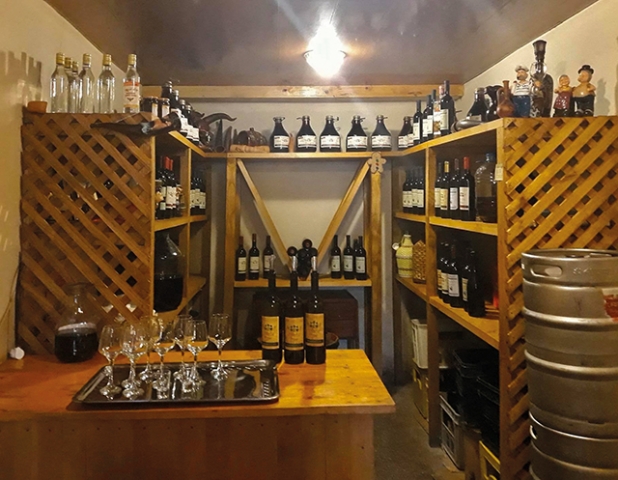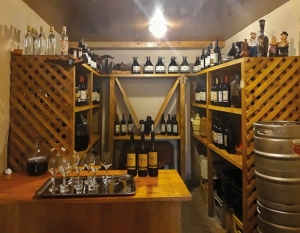CENN to Establish Wine Enterprise in Adjara within Keda Leader Project
Within the framework of the EU ENPARD program supported project ‘Optimizing the Potential of Local Assets for the Rural Development of Keda Municipality,’ CENN, a non-governmental organization working to protect the environment by fostering sustainable development, is to set up a wine enterprise for locals and international visitors in the village of Vaio, Keda Municipality, in Georgia’s Adjara region.
The project beneficiary is a local resident, Vladimer Shavishvili, whose project envisages the establishment of a wine enterprise, which itself will stimulate economic development in the region and increase wine production.
Three women and one man will be employed to run the project.
The project budget is 40,000 GEL, and the European Union is funding 28,000 GEL of that. With co-financing coming to GEL 12,000.
The objectives of the project “Optimizing the Potential of Local Assets for the Rural Development of Keda Municipality” are to diversify local economic activities, foster investment, and empower competitive agricultural and environmental practices in Keda Municipality via a bottoms-up strategic planning of rural development. The priority of the project is to increase Keda Municipality’s development potential and make optimal use of local resources.
The project is being implemented by CENN in partnership with the Center for Strategic Research and Development of Georgia (CSRDG), Institute of Democracy (IoD) and Austrian Institute for Regional Studies and Spatial Planning (ÖIR).
The project is supported by the European Union, which supports agriculture and rural development in Georgia through its ENPARD Program. Implemented since 2013 with a total budget of EUR 179.5 million, the main goal of ENPARD is to reduce rural poverty in Georgia. The first phase of ENPARD in Georgia focused on developing the potential of agriculture. The second and third phases of ENPARD focus on creating economic opportunities for the rural population that go beyond agricultural activities.
The following activities are being carried out within the project:
- Establishment and capacity building of the Keda Local Action Group (LAG) (involving AMAGs) and community-based institutions, raising awareness of the EU’s rural development approaches to the institutional building of the Keda LAG, linking and networking with other LAGs nationwide.
- Participatory development of a gender - and youth-sensitive Keda Rural Development Strategy (RDS), development of monitoring and evaluation (M&E) tools for implementation of the Keda RDS, approval of the Keda RDS by the relevant state authorities in Adjara.
- Implementation of innovative projects (through sub-grants under the strategy) to foster economic and investment opportunities and inclusive rural growth, and improve the well-being of rural communities (identification of sustainable projects generating new employment opportunities, financing and implementation of innovative projects); participatory development of the Keda Marketing and Communication Strategy; the Invest in KEDA active media outreach and marketing campaign; organization of the Keda business forum and Keda Rural Festivals; exchange and site visits to promote projects and attract investments; and capacity building and promoting opportunities for rural youth (organization of youth camps, support of youth initiatives/projects).
Beneficiaries are selected on the basis of grant competitions announced within the project.
Currently, 46 funded projects are being implemented in Keda Municipality.
One of the main goals of the project is to create additional jobs on the ground. That is why, when evaluating projects, special attention is devoted to the employment component. For instance: about 290 jobs were created within the projects funded by the first and second grant competition.
GEORGIA TODAY interviewed the project beneficiary, Vladimer Shavishvili, a well-known and experienced Georgian winemaker from the Adjara region, to find out more about the project and its benefits for the local economy.
Your project envisages the establishment of a wine enterprise in Keda Municipality. What has been achieved to date and what are your plans?
I own vineyards in the village of Vaio, where especially tasty Chkhaveri wine is produced, which makes locals proud. I’ve been producing almost all the best-known Georgian wine varieties, including Ckhaveri, Aladasturi, Kindzmarauli, Saperavi, etc., in our family winery, called ‘Shavishvili Wine Cellar,’ for almost 50 years now. Tourists love to visit my cellar and discover the traditional method of grape-pressing and wine producing during Rtveli (a traditional vintage and rural harvest holiday in Georgia accompanied by feasts, musical events and other celebrations).
I harvest about 10 tons of grapes in my family cellar annually; however, thanks to the project “Optimizing the Potential of Local Assets for the Rural Development of Keda Municipality,” I will be able to own a much larger enterprise and produce even more high-quality Georgian wine there.
How did you get involved in the Keda Leader project and how did you receive funding?
I wanted to expand my business, but my financial resources were not enough for this purpose. Accordingly, I decided to submit an application for the grant announced by the ‘Keda Leader’ project. My idea to establish a wine enterprise in our municipality received funding. Currently, I am personally involved in the preparation and construction works on the spot and we hope that it will be completed in the coming months.
How will the project support the employment of locals?
Of course, the project is important for the employment of locals. I have already employed several people in my vineyards, but when the wine enterprise starts functioning, I will be able to contribute to employing local residents more actively. It will create more future prospects and job opportunities for them, which is especially important for me, as I want to help the local population and contribute to improving their living conditions.
When will the construction of the enterprise be complete? What scale of production do you expect?
Weather conditions have an important role in the pace of construction, but I hope that by May the enterprise will be able to start functioning at full capacity. As for scale, I expect it will significantly increase compared to the amount I managed to produce at my current family cellar with its relatively small size.
Establishing a wine enterprise will further contribute to increasing the popularity of Georgian wine among tourists, as Adjara region boasts a high number of international visitors, especially in summer. The above is crucial for the development of the local economy.
Are you going to produce bottle wine or Qvevri wine?
I’ve been producing wine for almost 50 years, focusing on bottling the most popular Georgian wine varieties, and this process will continue on a larger scale in the new enterprise.
What are the main benefits of the Keda Leader project implemented by CENN?
The first and foremost benefit is that the project contributes to the rural and economic development of the region and the entire country. For us, owners of small businesses in mountainous Adjara, such initiatives are especially important.
I would like to express my sincere gratitude towards CENN, which is the direct implementer of the project, and its partner organizations, for giving me the opportunity to implement my business idea. I am looking forward to opening the enterprise as soon as possible to welcome international as well as local visitors, to show them the process of producing famous Georgian wine and to let them enjoy its amazing taste and flavor. I’m sure it will be an equally pleasant and joyful process for all of us.
Within the framework of the Keda Leader project, the development and promotion of various local initiatives is planned, along with organizing festivals, campaigns, and training of project beneficiaries and local development group members to strengthen their abilities.
In addition, measures are planned to attract additional investment that will contribute to the economic development of the municipality.
The project and the Local Action Group (LAG) will continue to collaborate with the Ministry of Agriculture of Adjara, UN Food and Agriculture Organization (FAO) and UNDP to fund various initiatives in the municipality.
By Ana Dumbadze











